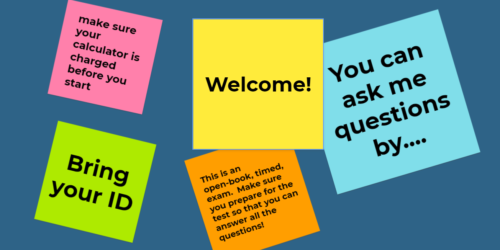Working With Mark Pushback and Course Concerns from Students
It is a given that in any semester there will be a few students who push back hoping to increase their mark or suggesting that their mark was low due to unclear instruction or content not having been taught thoroughly. The ensuing conversations can be both challenging and rewarding.
When such instances arise, it’s natural (especially for new faculty members) to feel defensive, especially if you’ve put a lot of effort in to designing and explaining assessment instructions and rubrics, you might expect students to be grateful. This was certainly the case for me when I started teaching. However, with experience, I have now come to approach these moments of pushback and student concern about their grades with hope and curiosity instead.
What purposes does pushback serve?
- Quality Assurance: You can hear directly from the student(s) as to how they perceived the course delivery and make adjustments for next time. It’s okay to admit that you wish you had done something differently (explained the assignment instructions more clearly, gone over the rubric in class a few weeks before the assignment was due etc.)
- Community-Building: In working though the difficult conversation and coming to respectful resolution, you and the student(s) or class can build a stronger relationship and shared purpose.
- Respect: The student is likely upset, confused, angry, disappointed, shocked etc. – lots of big emotions. By walking through a student’s concerns with them, you can demonstrate empathy, honour their perspective, and help the student to feel better.
- Quality Control: Maybe you made a mistake or oversight under the pressure of heavy marking and now can make a correction and change their mark accordingly. Alternately, this might be an opportunity for you to show the student(s) the careful thought that went into your grading decision(s) and stand firm on the standards that are required.
- Building Trust: You can use this opportunity to show the student(s) that you are open to listening to their voice(s) and ready to make adjustment where valid.
- Honesty and Accuracy. There has been a great deal of discussion in recent years about grading systems at post-secondary institutions in North America; specifically how grade inflation can be a de-motivating factor for students. By providing students with an “honest evaluation of their performance” you will also help students improv their work ethic and uphold the reputation of Conestoga and the courses offered therein (Gearson, 2020, n.p.).
Why might responding to pushback be more challenging when teaching online?
In the past when students would regularly see you, their peers, and Student Services face-to-face, there were frequent opportunities to resolve uncertainties regarding expectations, standards and rules for assignments, or confusion over course content. In an online environment, students are less likely to ask questions of you, each other, or to reach out to a student support person. As discussed by Barclay and Chatoor (Higher Quality Council of Ontario, 2021), the hidden curriculum – understanding unspoken expectations – has always been more of a challenge for marginalized students and first generation students. In addition, such students may also not know the way in which you expect them to approach you with grade complaints and they may present their concerns in ways you find surprising. Please remember there are many layers to how various generations, cultures, and professions approach conflict resolution.
Students less engaged as they study from home seem more likely to use unhelpful strategies such as delaying work on assignments, not asking questions, submitting work which is not up to requirements, and getting upset with the results. If all this sounds familiar, the following suggestions for introductory conversation statements may help you.
Example Statements
Depending on your scenario, some of the below example scripts might be helpful to choose from or adjust when you meet with a student or students about their concern(s).
Remember: Before you meet with the students, take a breath and remind yourself not to be defensive. Students are concerned about their grades and work and a sense of fairness. Your interaction can be a conversation rather than a confrontation.
At the start of a meeting
Thank you for meeting with me. I am hoping we can come to an understanding and I can learn from your comments and suggestions.
Outlining the steps of the process
I am happy to review the mark with you. As I suggested by email, we can look at what was assigned, the grades you were given and where you see evidence that you should have achieved a higher mark than you received.
If several students have reached out to you concerned about their grades
I appreciate the group of you joining me for a meeting. I really want this course to help you to learn about X and I had hoped the exam would give you a chance to demonstrate your learning. Can I hear one by one from each of you about your main concern? Once I have heard from each of you, I will be able to respond more effectively.
If students complain about more than just a grade
I understand you have concerns about the course. Thank you for sharing them with me and with my Chair. My goal today is to try to find the root cause of why the course isn’t meeting your needs and expectations so that I can address these concerns with you and potentially make some changes.
For Further Reflection
It can feel stressful and overwhelming to deal with a complaint when you already have a lot on your plate–(especially if the majority of students in your class seem to have understood instructions and feel that assessments and grading was fair). However, it has been my experience that a great deal of learning emerges for both faculty and student(s) alike when they engage in these difficult conversations in good faith.
References
Gearson, G. (2020, March, 21). Make Harvard Grade Again. Harvard Political Review.
Retrieved on May 10 2022 from: https://harvardpolitics.com/make-harvard-grade-again/
Higher Education Quality Council of Ontario. (2021, April 7). First-generation students are vulnerable to the loss of student-to-student connections amidst a remote learning environment. First Policy Response. Retrieved November 25, 2021, from https://policyresponse.ca/first-generation-students-are-vulnerable-to-the-loss-of-student-to-student-connections-amidst-a-remote-learning-environment/.




